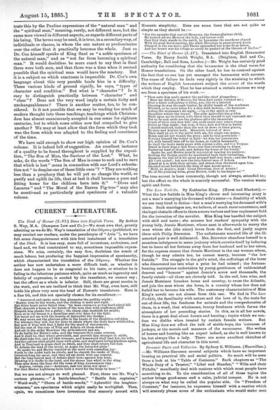The Law Forbids. By Katharine King. (Hurst and Blackett).— What
the law forbids in Miss King's clever and interesting story is not a man's marrying his deceased wife's sister—a disability of which we are very tired in fiction—but a man's marrying his deceased wife's niece. Such marriages are, we believe, of much rarer occurrence, and the legal obstacle offers to them a more various and less unpleasant field for the invention of the novelist. Miss King has handled the subject
with skill and taste ; she arouses her readers' sympathy with the young lady, Jennie Mortimer, whose aunt is afterwards to marry the
man whom she (the niece) loves from the first, and justly angers them with Philip Brewster. The unfortunate married life of the ill- assorted pair is well delineated. Mrs. Brewster abandons herself to a senseless indulgence in mean jealousy which outwits itself by inducing her to leave all her fortune away from her husband and to her-niece, for the express reason that Jennie Mortimer is the one woman whom, though he may admire her, he cannot marry, because " the law forbids." The struggle in the girl's mind, the sufferings of the lover who discovered too late what a prize he had missed ; the fortune- hunting enterprises undertaken by young gentlemen of unblemished descent and " honour " against Jennie's acres and thousands, the family cabals—all these are cleverly told. In the end, love wins, and Jennie Mortimer forsakes home and country, to cross the Atlantic, and join the man whom she loves, in a country whose law does not forbid her to become his wife. The customary characteristics of Miss King's novels are not absent from this one. We find in The Law Forbids, the familiarity with nature and the love of it, the taste for out-of-door life, the fondness for animals and the comprehension of them, in a word, that wholesome, breezy freshness which forms the atmosphere of her preceding stories. In this, as in all her novels, there is a great deal about horses and hunting ; topics which we con- fess we dislike when treated by certain female writers. But Miss King does not affect the talk of stable-boys, the 'cuteness of jockeys, or the morals and manners of the raceoourse. She writes of horses and hunting like an expert indeed, as she is well known to be, but always like a lady. There are some excellent sketches of agricultural life and character in this novel.


































 Previous page
Previous page